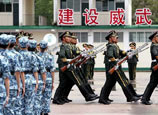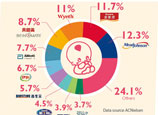
WASHINGTON, July 16 (Xinhua) -- Two-way fluctuation of the Chinese currency Renminbi (RMB) exchange rate is essential for China's exchange rate reform, an expert from a U.S. think tank said.
TWO-WAY FLUCTUATION
"I think an important part of the reform is recognizing that flexible exchange rate policy for China, which is good for China and good for the world, means that the exchange rate needs to move up and down," Yukon Huang, a senior associate with the Asia Program of the Carnegie Endowment for International Peace, told Xinhua.
"It cannot be consistently always appreciating because an exchange rate which is only moving in one direction encourages speculation and that's not actually very good," he said in a recent interview on China's exchange rate reform initiated in 2005.
As the Chinese economy is slowing down and its trade surplus shrank to about 2 percent of gross domestic product (GDP), Huang believed that it is really important now for the country to boost the flexibility of RMB exchange rate.
"If there's a period where the exchange rate of RMB actually depreciates for a couple of months, that's fine," he said.
The RMB has nominally appreciated against the strong U.S. dollar by about 2 percent since the beginning of this year, while many emerging market currencies depreciated sharply in the same period.
"So successful reform of the exchange rate regime is when you realize that the exchange rate can move both ways and speculators of markets can no longer predict the direction of change," Huang argued.
"I think that's slowly happening and I think it is very good for China," he added.
Yi Gang, deputy governor of the People's Bank of China, also told a press briefing last week that there had been two-way fluctuation expectations of RMB exchange rate in the recent spot and forward exchange rate markets, which indicated that the Chinese currency had become more market-oriented.
As a very important feature of the exchange rate reform, the supply-and-demand relation in the market will play a more important role in deciding the exchange rate of RMB, Yi noted.
INVESTING OVERSEAS
Huang said it is unrealistic for China in the next two years to accomplish capital account convertibility, which requires strong financial institutions, deep capital markets, especially a well-developed domestic bond market, and investors' financial education.
However, he said China should continue to remove restrictions of capital flows and encourage Chinese companies and households to invest overseas, dismissing concerns on massive capital outflows.
"China's worry is not that there would not be enough money coming into China. China's worry in my view is there's too much money coming in, which means it should actually be more flexible in letting money leave China," Huang said.
China's central bank is under pressure to try to sterilize these capital inflows pushed by ultra-loose monetary policies in the U.S. and Europe, he said.
Huang added that even though China's economic growth rate slows to 7 percent, China will continue to be relatively attractive for incoming capital because it is still higher than that of the West and other Asian countries.
So it is far better for Chinese households and companies to invest overseas, such as buying foreign stocks and properties, to earn more than investing in U.S. treasury bonds by China's foreign exchange reserves, he said.
RMB INTERNATIONALIZATION IN EAST ASIA
In a practical sense, Huang believed that the internationalization of RMB could logically begin within the East Asian region.
On one hand, China has desire to pay RMB to East Asian countries as it runs significant trade deficits with them, and these countries are also willing to hold RMB that is relatively stable.
On the other hand, East Asian countries can benefit from greater use of RMB because China is so central to the so-called East Asia Production Sharing Network. Products like computers and iPhones are based in parts and components in other East Asian countries, assembled in China and then shipped to the West.
"If the RMB becomes an international currency within East Asia, I think it's a safe way to learn about its merits... You can allow the RMB to flow more freely. After all there're major RMB markets already existing in East Asia," Huang said. "I think that will be a nice first step in terms of internationalizing the RMB."
He said that if China's economy continues to grow at 6-8 percent a year for the remainder of this decade, its fiscal position will be reasonably solid and financial situation will be sound.
"I don't see much risks in terms of the internationalization of RMB," Huang said.
















 116-year-old Chinese woman recognized as world's oldest
116-year-old Chinese woman recognized as world's oldest


![]()
